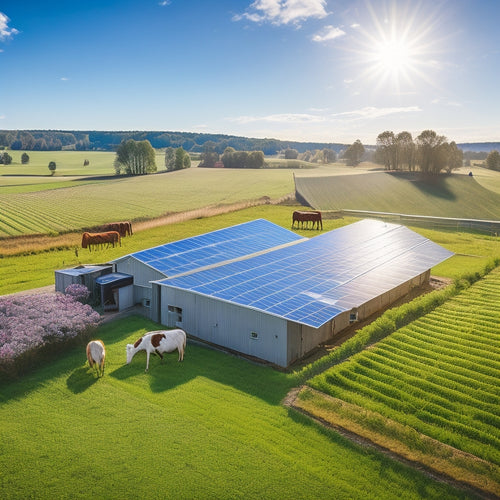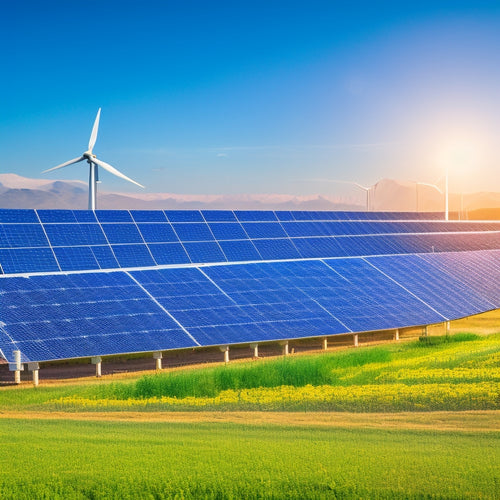
Rooftop Solar Power
Share
You're considering rooftop solar power, a clean and efficient way to generate electricity from your home's rooftop, reducing your reliance on fossil fuels and shrinking your carbon footprint in the process. By installing solar panels, you'll not only minimize environmental impact but also enjoy financial benefits like reduced energy bills and increased property value. High-efficiency inverters play an essential role in maximizing energy output, and proper system sizing, installation, and maintenance are important for peak performance. Evaluating your roof's shading patterns is also critical for best energy harvesting. As you investigate rooftop solar power, you'll uncover more about how to utilize its full potential.
The Essentials
- Rooftop solar power generates clean energy, reducing reliance on fossil fuels and lowering emissions to combat climate change.
- Installing rooftop solar power offers significant financial savings through government support, rebates, and tax credits.
- Rooftop solar installations enhance property value, attracting higher selling prices and appealing to eco-conscious buyers.
- Optimizing energy harvesting is crucial for rooftop solar power systems to ensure effective energy capture and conversion for maximum output.
- Proper system sizing, installation, and maintenance are essential for maximizing energy production and reducing waste.
Reduce Carbon Footprint Now
You can markedly reduce your carbon footprint by adopting rooftop solar power, which enables you to generate clean energy and lower your reliance on fossil fuels.
By utilizing Solar Power and Battery Storage solutions, you'll not only minimize your impact on the environment but also contribute to a sustainable future, while also breaking free from reliance on the grid and reducing your electricity bills.
As you switch to solar power, you'll immediately start lowering emissions now, making a tangible difference in the fight against climate change.
Go Green Today
Going green today is an essential step towards reducing your carbon footprint now, as the world grapples with the challenges of climate change. By installing rooftop solar power, you can take advantage of solar incentives and enjoy significant financial savings.
Although the initial installation costs may seem intimidating, government rebates and tax credits can help offset the expense. Furthermore, you'll be contributing to environmental benefits, such as reducing air pollution and conserving natural resources.
With energy independence, you'll be less reliant on the grid and will have more control over your energy consumption. By integrating solar power into your building's design, you can guarantee a reliable and efficient energy supply that supports your business's growth and success Renewable Energy Solutions.
Additionally, commercial solar installations offer a sustainable alternative that minimizes your carbon footprint and contributes to a cleaner, healthier planet. Proper maintenance is key, so be certain to follow maintenance tips to guarantee ideal performance.
As technology advancements continue to improve, the efficiency and effectiveness of solar power systems will only increase. Plus, you'll be making a positive community impact by setting an example for others to follow in your footsteps.
Lower Emissions Now
Carbon neutrality is no longer a distant goal; it's a pressing necessity. You're likely aware of the devastating impact of climate change, and the role you can play in reducing your carbon footprint.
By switching to rooftop solar power, you're taking a significant step towards minimizing your reliance on fossil fuels and lowering emissions. Additionally, integrating solar panels into your home's design through Building Integrated Photovoltaics can enhance your home's energy efficiency and aesthetic appeal.
Solar incentives are available to encourage you to make the shift to renewable energy. You can benefit from tax credits, rebates, and other financial incentives that make installing solar panels more affordable.
Furthermore, with the cost of solar panels decreasing over the years, it's become a more viable option for homeowners.
Boosts Property Value Instantly
When you install rooftop solar power, you'll instantly enhance your property's value by increasing its energy efficiency and reducing its carbon footprint renewable energy systems.
You can expect a significant increase in your selling price, as buyers are willing to pay a premium for homes with solar panels.
In fact, studies have shown that solar-powered homes retain a higher resale value, giving you a competitive edge in the market.
Increased Selling Price
Installing rooftop solar power greatly enhances your property's value, with studies suggesting that every dollar saved on electricity bills translates to a $15 increase in your home's selling price.
This increased selling price is a direct result of the significant savings you'll enjoy on your energy bills, making your property more attractive to potential buyers.
Incentive programs and financing options can help offset the initial installation costs, making it more feasible to invest in rooftop solar power.
As market demand for sustainable energy solutions continues to grow, buyer preferences are shifting towards energy-efficient properties.
Technological advancements in solar panel technology have also improved efficiency, further increasing the appeal.
Regional regulations and community awareness about the importance of energy independence also play a role in driving up demand.
Additionally, with minimal maintenance considerations, rooftop solar power is a hassle-free way to enhance your property's value and appeal to environmentally conscious buyers.
Higher Resale Value
Value appreciation is a critical consideration for homeowners, and rooftop solar power delivers a significant enhancement to your property's resale value. By installing a rooftop solar power system, you can elevate your property's value instantly, making it more attractive to potential buyers. This is because solar panels are seen as a desirable feature, particularly among environmentally conscious buyers who value energy independence.
According to market trends, homes with solar panels sell for a premium, with some studies suggesting an increase of up to $15,000 in resale value.
In addition to buyer preferences, rooftop solar power also provides financial incentives, such as tax credits and long-term savings on energy bills. While installation costs may seem prohibitive, local regulations and financial incentives can help offset the expense.
Additionally, solar panels can enhance your home's aesthetic appeal, making it more attractive to potential buyers. With the rising demand for sustainable living, investing in rooftop solar power can be a smart move for homeowners looking to increase their property's resale value.
High-Efficiency Inverters Matter
You'll want to guarantee your rooftop solar power system is equipped with high-efficiency inverters that can maximize power output, which is especially important when paired with deep cycle batteries for energy storage.
These inverters optimize energy harvesting by converting DC power from your solar panels to AC power for your home, minimizing energy losses along the way.
Additionally, having a high-efficiency inverter can also help reduce your reliance on utility bills. By choosing an inverter with a high efficiency rating, you can generate more power from the same amount of sunlight.
Max Power Output
What determines the maximum power your rooftop solar power system can produce? The answer lies in the combination of your solar panel's efficiency and the inverter's ability to convert DC power to AC power. High-efficiency inverters play an essential role in maximizing your system's peak production.
| Inverter Efficiency | Solar Panel Efficiency | Max Power Output |
|---|---|---|
| 95% | 20% | 19% of total potential |
| 98% | 22% | 21.56% of total potential |
| 99% | 25% | 24.75% of total potential |
As you can see from the table, even a small increase in inverter efficiency can greatly impact your system's max power output. When paired with high-efficiency solar panels, the results are even more impressive. By choosing the right inverter and solar panel combination, you can guarantee that your rooftop solar power system operates at its full potential, giving you the freedom to generate clean energy and reduce your reliance on the grid.
Energy Harvesting Optimization
Optimizing energy harvesting is a vital aspect of rooftop solar power systems, as it directly impacts the amount of clean energy generated. You'll want to guarantee that every component of your system is working in harmony to maximize energy production.
This starts with panel placement, where you'll need to take into account factors like orientation, angle, and shading to get the most energy out of your solar panels. Proper system sizing is also essential, as an undersized system won't meet your energy needs, while an oversized system will waste resources.
By leveraging advanced solar technology, you can enhance energy efficiency and reduce waste. High-efficiency inverters play a significant role in this optimization process, as they convert DC power from your panels into usable AC power for your home.
Inverter selection, installation techniques, and performance monitoring are all vital aspects of energy harvesting optimization. Additionally, you'll need to take into account grid integration, financial incentives, and maintenance strategies to guarantee your system operates at peak performance over its lifespan.
Assess Your Roof's Shading
You'll need to assess your roof's shading patterns to guarantee ideal solar panel performance. Obstructive tree branches, in particular, can greatly reduce energy output, so identify any branches that may be casting shade on your roof.
When setting up your solar panel system, consider investing in an Easy Connection Kit to assure a seamless and efficient connection to the grid. Additionally, proper wiring and junction box installation are vital to maximize energy production.
Shading Patterns Matter
Evaluating your roof's shading patterns is an important step in determining the viability of a rooftop solar power system. You'll want to conduct a shading analysis to identify areas that receive partial or full shade throughout the day. This is vital because shade can greatly impact solar efficiency. Even a small amount of shade can reduce energy production by up to 50%.
To conduct a thorough shading analysis, you'll need to take into account the orientation and slope of your roof, as well as the surrounding environment.
Take note of any obstructions, such as chimneys, skylights, or vents, that could cast shade on your solar panels. You should also account for the changing seasons, as the angle of the sun varies throughout the year.
Obstructive Tree Branches
Tree branches are a common culprit when it comes to obstructing sunlight and reducing solar panel efficiency. As you assess your roof's shading, it's vital to take into account the impact of tree branches on your solar access. Conduct a shade analysis to identify which branches are casting shade on your roof. You may need to trim or remove branches to guarantee ideal sunlight exposure.
Growth management is key, as unchecked tree growth can lead to reduced solar panel efficiency over time.
Take into account the canopy height and tree placement when evaluating the impact of branches on your solar panels. Branch removal can be an effective solution, but it's important to evaluate the tree's health and structural integrity before pruning.
Foliage management is critical, especially during seasonal changes when leaf growth or shedding can affect solar access. By taking a proactive approach to tree trimming and growth management, you can assure maximum sunlight exposure and enhance your rooftop solar power system's performance.
Lower Energy Transmission Losses
When you generate solar power on your rooftop, you're reducing the distance energy has to travel to reach your home.
This proximity advantage leads to lower line losses, as less energy is wasted during transmission.
Reduced Line Losses
By generating power on your rooftop, you're reducing the distance it has to travel to reach your home, which in turn minimizes line losses. This reduction in line losses is a significant advantage of rooftop solar power, as it enhances transmission efficiency and guarantees that more of the solar energy generated reaches your home.
With rooftop installations, you're decentralizing power generation, reducing your reliance on grid connectivity, and utilizing renewable resources. This decentralized approach to energy distribution reduces the strain on the grid, resulting in lower transmission losses and a more efficient use of the energy generated.
Additionally, by reducing the distance energy has to travel, you're also reducing installation costs and maintenance requirements. This, in turn, minimizes the environmental impact of your energy consumption, giving you greater control over your energy usage and a cleaner conscience.
Frequently Asked Questions
Can I Install Rooftop Solar Power on a Rented Property?
Before installing any upgrades, you'll need to obtain your landlord's approval, as specified in your rental agreements. This guarantees you're not violating any terms, and they're aware of the changes you're making to their property.
Are Rooftop Solar Panels Noisy or Disruptive?
When you're trying to relax, sudden noises can be jarring. Similarly, you might wonder if rooftop solar panels will disrupt your peace. Rest assured, the installation process is designed with noise reduction in mind, ensuring a seamless and quiet experience.
Do Rooftop Solar Panels Work During Power Outages?
During power outages, you won't get electricity from the grid, but with battery storage, you can achieve grid independence, ensuring you'll have power when you need it most, as long as your system's designed to operate off-grid during outages.
Can I Install Rooftop Solar Power on a Metal Roof?
You're not limited by a metal roof, in fact, it's a perfect canvas! Metal roofs offer advantages like durability and weather-tightness, making them compatible with solar panels, which can be securely fastened and angled for ideal energy harvesting.
Are Rooftop Solar Panels Covered by a Warranty?
When purchasing solar panels, you'll typically find they're backed by a warranty covering defects and performance for 25 years or more, ensuring your investment is protected throughout the panel's expected lifespan of 30 years or more.
Final Thoughts
By utilizing rooftop solar power, you're not only slashing your carbon footprint, but also turbocharging your property's value. High-efficiency inverters guarantee maximum energy harvest, while a shading assessment optimizes panel placement. And, by generating power locally, you sidestep transmission losses. The result? A clean, sustainable energy future that's within arm's reach. Seize it, and you'll be basking in the glow of a greener tomorrow, where every ray of sunlight is a step towards a brighter, more sustainable future.
Related Posts
-

What Do I Need to Know About Farm Solar Panels
When considering farm solar panels, you need to assess costs, benefits, and technical specifics. Initial investment c...
-

Top Portable Refrigerators for Camping Adventures
When you're camping, having a reliable portable refrigerator can make all the difference for keeping your food fresh ...
-

The Role of Battery Monitoring Systems in Renewable Energy
Battery monitoring systems play an essential role in renewable energy by enhancing system longevity and optimizing pe...


